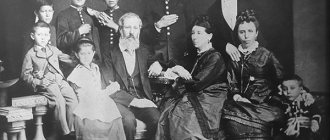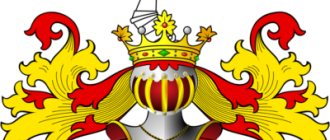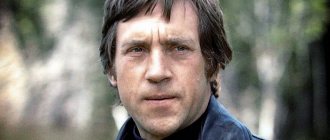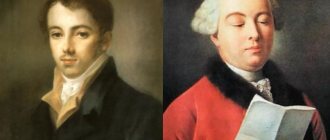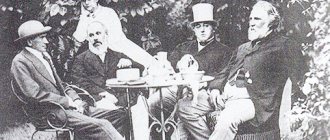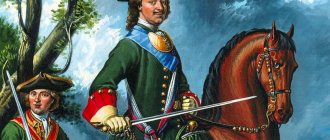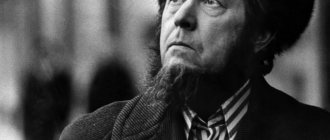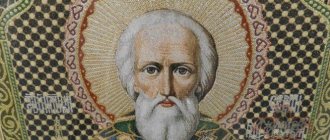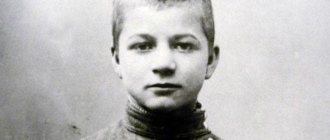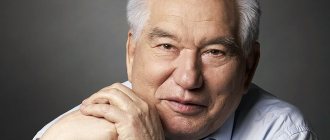December 5, 1820 – December 3, 1892 (71 years old)
4.6
Average rating: 4.6
Total ratings received: 7271.
Afanasy Afanasyevich Fet (1820–1892) - famous Russian poet with German roots, translator, lyricist, author of memoirs. Corresponding Member of the Academy of Sciences of St. Petersburg. The second half of his life he was an agronomist and devoted himself to household chores and wrote essays about agriculture in magazines.
The material was prepared jointly with a teacher of the highest category, Kuchmina Nadezhda Vladimirovna.
Experience as a teacher of Russian language and literature - 27 years.
The poet's work
In Fet’s short biography, it is worth noting that his first poems were written by him in his youth. Fet's poetry was first published in the collection "Lyrical Pantheon" in 1840. Since then, Fet's poems have been constantly published in magazines.
Trying in every possible way to regain his title of nobility, Afanasy Fet went to serve as a non-commissioned officer. Then, in 1853, Fet’s life involved a transition to the Guards Regiment. Fet's creativity, even in those times, does not stand still. His second collection was published in 1850, and his third in 1856.
In 1857, the poet married Maria Botkina. Having retired in 1858, without having achieved the return of the title, he acquired land and devoted himself to farming.
Fet's new works, published from 1862 to 1871, comprise the cycles “From the Village” and “Notes on Free Labor.” They include short stories, short stories, and essays. Afanasy Afanasyevich Fet strictly distinguishes between his prose and poetry. For him, poetry is romantic, and prose is realistic.
Nikolai Nekrasov wrote about Fet: “A person who understands poetry and willingly opens his soul to its sensations will not find in any Russian author, after Pushkin, as much poetic pleasure as Mr. Fet will give him.”
A. A. Fet is the author of wonderful poems for children. Their popularity among young readers is due to the fact that the poet’s poems are kind and surprisingly understandable even to the smallest.
Fet landowner-writer
After retiring, A. Fet, who by that time was already a married man, decided to start developing the estate he bought in 1860 in his homeland. One of the most lyrical and romantic poets in Russia, in life he was quite an enterprising person and a successful landowner. On his 200 acres of land, A. Fet developed an extensive farm: he built a house for himself, grew rye and other grain crops, launched a stud farm, raised cows, sheep and poultry, was engaged in fishing and beekeeping. Within a few years, Fet’s farm grew stronger and began to generate an annual income of 5-6 thousand rubles. By the way, apple marshmallows from his estate were even delivered to the imperial table.
Fet in Vorobyovka (1890)
At the same time, Afanasy Afanasievich did not just want to work on the land and thereby ensure a decent existence for his family and his peasants. He wanted to introduce something new into the very system of land management, into the relationship between the peasant and the landowner. He quite strictly and persistently tried to restore order both on his estate and between his neighbors, tried to replace manual labor with machine labor and often encountered misunderstanding, opposition and real stubbornness from the peasants, who did not want to mechanize labor in any way.
On the one hand, they did not have enough knowledge to work on mechanical threshers, plows and other latest equipment, on the other hand, they simply did not want these innovations. From Fet's notes:
“However, not only knowledge is lacking, but also appropriate psychology. After all, a machine “requires uniform but constant effort. While it is walking, you can’t stand... This is the quality of the machines, out of habit, our peasants don’t really like yet. The poor landowner G. installed a threshing machine and hired hammermen... Three days later, the workers demanded a settlement..." Why, father, it’s unbearable to live. Walk in front of the car yourself: look at it, it’s empty, if only it would falter.”
last years of life
In 1873, Afanasy Fet was returned to the title, as well as the surname Shenshin. After this, the poet engages in charity work. At this stage, Afanasy Fet’s poems were published in the collections “Evening Lights”, of which four issues were published from 1883 to 1891. Fet's poetry contains mainly two themes: nature, love.
Death overtook the poet on November 21, 1892 in Moscow in his house on Plyushchikha. Fet died of a heart attack. Afanasy Afanasyevich was buried in the Shenshin family estate in the village. Kleymenovo, Oryol province.
Fet's personal life
Fet met his future wife Maria Botkina during a trip to Europe. Maria Botkina was no longer young and did not have an attractive appearance. She came from a wealthy family. It must be assumed that Fet married for convenience, since before he was passionately in love with Maria Lazic, a Serbian by birth, the daughter of a general. But she died in an accident after Fet initiated the separation without bringing the matter to the wedding. The poet did not have enough money to support his wife, and they could not give Maria a rich dowry.
Afanasy Fet's wife - Maria
But this marriage turned out to be very successful. The wife not only brought money into the family piggy bank, she surrounded her husband with attention and care, was an interesting conversationalist, and a friend of the poet. They lived amicably, but the couple did not have children.
Interesting Facts
- In addition to writing poems, Fet was engaged in translations until his old age. He owns translations of both parts of Goethe's Faust. He even planned to translate Immanuel Kant's book "Critique of Pure Reason", but abandoned this idea and took up the translation of the works of Arthur Schopenhauer.
- The poet experienced a tragic love for Maria Lazic, a fan of his work. This girl was educated and very talented. Their feelings were mutual, but the couple failed to link their destinies. Maria died, and the poet remembered his unhappy love all his life, which influenced his work. It was to her that he dedicated the poem “Talisman”, the poems “Old Letters”, “You suffered, I still suffer...”, “No, I haven’t changed. Until deep old age..." and other poems.
- Some researchers of Fet's life believe that the poet's death from a heart attack was preceded by a suicide attempt.
- It was Fet who authored the famous phrase that was included in “The Adventures of Buratino” by A. N. Tolstoy - “And the rose fell on Azor’s paw.”
All interesting facts from Fet's life
Fet publicist
Afanasy Afanasievich outlined all his observations and thoughts on this matter in several journalistic essays. As one would expect, contemporaries reacted ambiguously to them, many laughed at Fet, and some openly scolded him. Moreover, this happened in the 60-70s of the 19th century, when in Russia people were just learning to live in a new way. The peasants, having received their freedom, simply did not understand what to do with it... Of course, Fet was offended by these attacks and ridicule; in one of his letters to Leo Tolstoy he wrote:
“Turgenev returned to Paris, probably with his brother’s money and having benefited Russia, that is, sending his peasants around the world... cutting down forests, plowing the land, ruining buildings and stripping cattle down to the wool. This one loves Russia. Another digs a well in the waterless steppe, plants a forest, preserves forests and gardens, breeds high breeds of animals and plants, gives the people income - this one does not like Russia and is an enemy of progress.”
Fet devoted 17 years of his life to active landownership. Describing his experience, he tried to convey to his contemporaries that the landowner is not always the villain that they are used to portraying him; more often than not, he is also a victim of the circumstances that have developed in post-reform Russia. His thoughts were almost unheard of at that time, although his essays differed from many others in that they contained a lot of practical experience, practical advice and recommendations, and not empty theory. For posterity, through his journalism, he left incredibly valuable information about the real state of affairs in Russia at that time.
Popular questions
Why was Fet deprived of his noble title?
Afanasy Afanasyevich was born on the family estate of his father, Afanasy Neofitovich Shenshin, who belonged to the ancient Shenshin family. The writer’s mother was the German Charlotte Foeth, whom the Russian nobleman met in Germany. Until the age of 14, Afanasy Afanasyevich bore his father's surname - Shenshin, but then it turned out that his parents got married according to Christian custom after his birth. As a result, Afanasy Afanasyevich was deprived of his legal surname, Russian citizenship and noble title.
Who did Fet consider his mentor in literature?
In 1837, young Afanasy Fet came to conquer the capital, where for six months he studied under the guidance of the famous journalist, writer and publisher Mikhail Petrovich Pogodin. Thanks to this preparation, he became a student at the Faculty of Russian Literature at Moscow University. Pogodin was the first person to whom Fet brought his poetic works to court. Mikhail Petrovich managed to transfer the manuscripts of the aspiring poet N.V. Gogol, and he highly appreciated his talent.
Where did Fet study?
In 1835-1837, Afanasy Fet studied at the German private boarding school Krummer. In 1837-1838 he lived in the boarding house of Mikhail Petrovich Pogodin, where he prepared to enter the university. In 1838 he entered Moscow University, first at the Faculty of Law, then at the historical and philological (verbal) department of the Faculty of Philosophy, from which he graduated in 1844.
Where did Fet serve?
In 1845, after graduating from university, Afanasy Fet became a non-commissioned officer in the cuirassier regiment of the Military Order, whose headquarters were located in Novogeorgievsk, Kherson province. After 8 years, he was seconded to His Majesty’s Uhlan Life Guards Regiment. During the Crimean War, he was in the Baltic Port as part of the troops guarding the Estonian coast. In 1858, Afanasy Afanasyevich retired with the rank of guards captain and settled in Moscow.
How does Fet perceive life?
The humiliation that Afanasy Fet experienced in his adolescence, unexpectedly losing his father's surname and noble title, left a big imprint on his entire future fate. He perceived the status of a “man with no name” as a terrible shame, and throughout his life he sought to regain his lost position in society. The injustice that Fet encountered in his youth developed in him a gloomy outlook on life and society. Afanasy Afanasyevich was a very difficult person to communicate with.
What does Fet consider to be the eternal source of beauty?
Despite his outward gloominess and isolation, Afanasy Afanasyevich had a subtle soul capable of responding to everything beautiful. The poet saw true, impeccable beauty in nature, in its slightest manifestation. They sang this harmony, this ideal beauty in their works.
What did Fet translate?
In Fet’s creative biography there was a place not only for poetry, but also for translations. Being a well-educated person who was fluent in several foreign languages, Fet was engaged in translations throughout his life. He translated lyric poems by German poets (Goethe, Schiller, Uhland, Heine, Rückert, Mörike), French (Chenier, Lamartine, Beranger), English (Byron, Moore), the Polish poet Mickiewicz, and the Persian poets Hafiz and Saadi. In the last years of his life, Fet devoted himself to translating the works of ancient poets: Horace, Virgil, Martial and others.
What did Fet write about?
Afanasy Afanasyevich Fet entered the history of Russian literature as a representative of “pure art.” He believed that the only goal of a real artist should be beauty. The main directions of his work were love, landscape and philosophical lyrics. Only in the last years of his life did his works become even more philosophical: the poet began to write about the unity of man and the Universe, about the highest reality, about eternity.
Which magazine did Fet collaborate with?
Afanasy Fet published his works in the most popular literary magazines of his time: Sovremennik, Moskvityanin and Otechestvennye zapiski.
What other last name did Fet have?
The real, “legitimate” surname of the Russian poet is Shenshin. He received it at birth from his father, a hereditary nobleman Afanasy Neofitovich Shenshin. However, when the poet turned 14 years old, it turned out that his parents got married according to Orthodox custom after his birth. As a result, the boy lost all his legal rights, including the right to bear the surname Shenshin, and began to bear his mother’s surname Fet.
Where is Fet's mother from?
Afanasy Fet's mother was the German Charlotte-Elizabeth Feth (nee Becker), the daughter of a German burgher. For some time she was the wife of Johann Fet, an assessor of the local court in Darmstadt, but her love for the Russian nobleman Shenshin forced her to leave her husband and move to Russia forever.
Boarding school education
The young man received his initial education at home. And at the age of 15, he was sent to study at the Krummer boarding school in the distant Livonian town of Verro (in what is now Estonia). It is not known why the parents chose a region so far from the Oryol province. The young man for three years - from the 35th to the 37th inclusive - was not at home and did not see any of his relatives; was the only Russian student. Fet experienced a lot of humiliation due to the change of surname and vague origin.
And although this period is traditionally presented by biographers as difficult, in general, despite a number of difficulties, Fet retains warm memories of this period of his life. According to the notes of the teachers, Afanasy Fet stood out among the students “for his spirit and energy.” Many were amazed at his success in technical sciences. He really knew how to repair watches, was quite well versed in the craft of turning (he could sharpen knives and skates and even turn chess pieces), and also mastered other crafts.
Of course, the young man also loved poetry. The work of Alexander Pushkin was one of his first poetic pleasures. Although it must be said that in his later lyrics he will not continue Pushkin’s traditions. Another thing is anthological poems, here he will act as the best student of a genius.
Afanasy Fet. 1860s
There, at the boarding school, Fet learned excellent German and Latin, which allowed him to become an excellent translator in the future. And in general, the atmosphere in the educational institution was friendly, the teachers treated the students in a fatherly manner. Fet retained good memories of his stay in the Livland region for the rest of his life. But at the same time, he, of course, missed home, family and the Russian language, which he had hardly heard during these three years.
In his book “The Early Years of My Life,” Fet wrote that, having returned home, taking his first horse ride after his arrival, at some point he could not control his emotions and, rushing to his native land, began to kiss her.
Death of Afanasy Fet
Afanasy Afanasievich died at the age of 71. Surprisingly, just like Fet’s birth, there are many secrets and unclear circumstances associated with Fet’s death. According to the memoirs of his secretary Ekaterina Kudryavtseva, the poet tried to commit suicide by stabbing a knife into his chest. She interrupted him and he ran into another room. There he tried to find another knife, but at that moment he had a heart attack and the poet died. Whether this actually happened or not, no one knows for sure. People who knew him closely confirmed that in his old age, when Fet’s health deteriorated, he found life burdensome. And it was his creativity that kept him on earth, which he valued above life.
Afanasy Fet with his friend, poet Yakov Polonsky. Late 1880s
